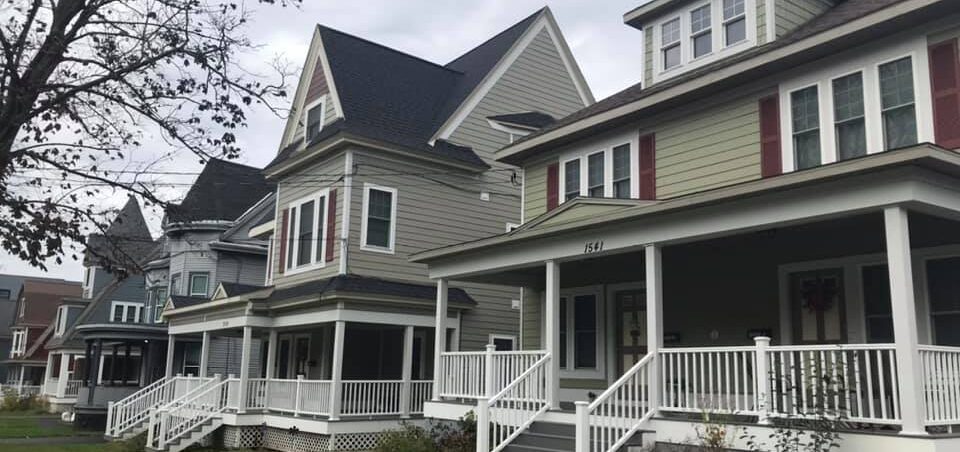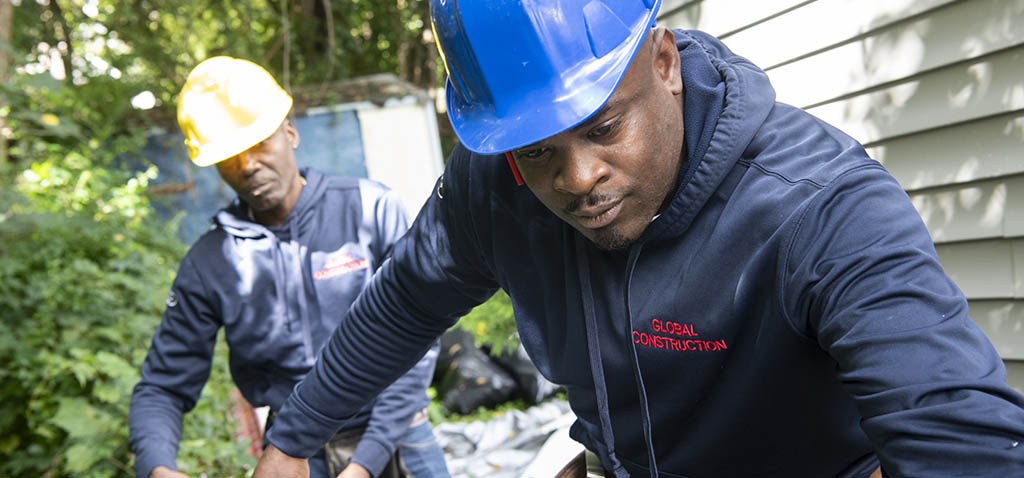Written by Wendy Rhodes
Wendy Rhodes, Director of Development & Communications of Legal Services of Central New York, tells us how the organization organized the community around an often unknown epidemic in poverty-stricken neighborhoods – unstable housing.
Eviction is a major challenge in our region. Over half of Syracuse residents rent their homes, and 58% of them have a housing cost burden. This means they spend more than 30% of their income on housing, leaving less money for food and healthcare and often putting them in the difficult position of having to choose which bills to pay each month. Upwards of 11,000 Syracuse residents face eviction each year, and throughout Central New York these numbers climb higher. Eviction is a significant contributor to housing instability and a challenge that we need to take on as a community.
To address this issue head-on, we at Legal Services of Central New York assembled a coalition of partners around our 2018 Evicted initiative. From July through October, we challenged communities throughout Central New York to read and discuss the eye opening and oftentimes heartbreaking book Evicted: Poverty and Profit in the American City by Princeton University sociologist Matthew Desmond. The New York Times declared it “…an exhaustively researched, vividly realized and, above all, unignorable book — after Evicted, it will no longer be possible to have a serious discussion about poverty without having a serious discussion about housing”. The book was recognized with a Pulitzer Prize and as one of the 10 Best Books of 2016 by the New York Times Book Review.
Evicted tells the real-life stories of eight families in Milwaukee caught in the relentless cycle of housing instability. Nearly all of their money goes towards rent yet they are still living on the brink of homelessness, constantly grappling with eviction, unsafe housing conditions, and dangerous neighborhoods. The book also highlights two landlords whose properties and business practices have a substantive impact on the futures of these vulnerable families. As Dr. Desmond notes, “without a home everything else falls apart”.
Evicted heartbreakingly demonstrates the impossible decisions and challenges people living in poverty face every day. How do you choose whether to pay for rent or heat if you only have enough money to pay for one? How can you build a pathway out of poverty when 80%, 90%, or even 100% of your income goes to rent (and your home may be unsafe, unsanitary, dangerous or illegal)? How is it possible that domestic violence victims are often evicted for reporting their abuser? How can children succeed in school when they are constantly moving, forcing rapid changes in schools throughout the school year and absences while their parents are looking for a new home and moving in crisis situations? How do children stay healthy when they are living in unsanitary conditions? How does all of this impact individual physical and mental health, and erode social and economic capital in neighborhoods?
City-Wide Book Club in partnership with the City of Syracuse
To present these questions and more, we co-hosted a Summer Book Club in partnership with the City of Syracuse and Mayor Ben Walsh. The free book club engaged people in neighborhoods across Syracuse and communities throughout our region with important conversations around housing stability.
More than 300 people registered for the book club and received weekly wrap-up emails with discussion questions and thoughts from local leaders which were compiled into a free Readers Guide which is still available at https://www.lscny.org/evicted-book-club/.
Participants encouraged their existing book clubs to read and discuss the book together, formed new clubs for the express purpose of reading and discussing the book, or read the book on their own and discussed it in our virtual book club on Facebook. More than 100 copies of Evicted were donated to the Onondaga County Public Library, and its eight city branches also hosted a series of book club discussions with special guest Sally Santangelo, executive director of CNY Fair Housing.
Book club participants, including local leaders who contributed to the Readers Guide were often surprised by the scope and challenges of housing instability in Syracuse and how directly the real-life stories in Evicted paralleled the experiences of Syracuse residents. Reading Evicted was also eye-opening for many participants, especially those who live in the suburbs. We constantly received feedback from suburban residents that they were not aware of the prevalence of poor housing conditions, instability, and eviction. One book club in DeWitt/Fayetteville even said they were considering purchasing a home, renovating it, renting to people living in poverty, and being landlords who are catalysts for change by working to break the cycle of poverty by providing safe, stable housing!
Free Community Event with Author Dr. Matthew Desmond
We also hosted a free community event on October 23 at Henninger High School as a culmination of the Summer Book Club. City of Syracuse Mayor, Ben Walsh, provided a welcome for the evening, and more than 800 people attended to meet and learn from author and MacArthur Genius Award recipient Dr. Matthew Desmond. Desmond highlighted the immense struggles of living in poverty. He expanded upon the personal stories highlighted in his book and illustrated the negative impact eviction has on individuals, communities, and society with compelling statistics and data. Dr. Desmond discussed another challenge faced by parents, especially black women, is that landlords typically view children as a liability and often refuse to rent to tenants with children. He showed that poverty leaves people constantly on the brink of crisis and seemingly small challenges such as a higher-than-expected heating bill can create an eviction situation. He also explained how eviction has a long tail, creating financial judgements and credit damage that follow people for years and contribute to an ongoing cycle of poverty.
We received overwhelmingly positive feedback regarding the Evicted initiative. One Southside resident, Ms. H, was the first attendee to arrive. She came by bus more than an hour early to make sure she got a seat. She knew the importance of this conversation and felt validated that people were acknowledging and talking about the struggles faced by people in her neighborhood every day. Another participant, Ms. A, who lives in Baldwinsville, shared that she had no idea what a devastating impact housing instability and eviction had on people’s lives or that it was a pressing issue in our region. Eviction was not something she saw in her circle of friends. Now that she is more aware, she plans to start volunteering with several local organizations working to address homelessness and poverty.



